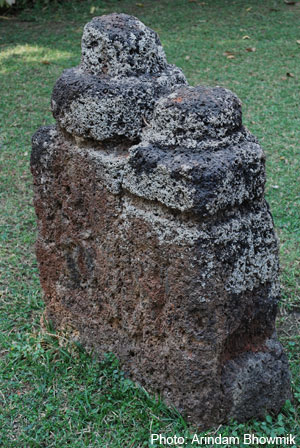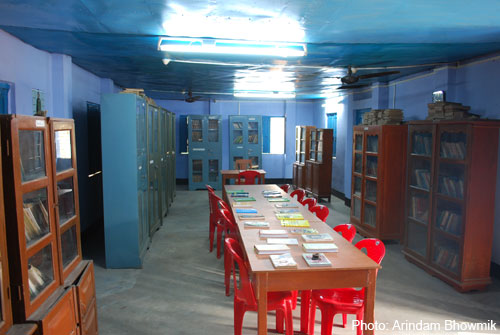 A Glimpse of Journey towards Tribal Development A Glimpse of Journey towards Tribal Development
Late Prof N. K. Bose very often used to send his scholars to study life and culture of the tribal people of undivided district Medinipur, West Bengal . One of his scholars late Prof Prabodh Kumar Bhowmick was assigned by, Prof Bose to collect information about Lodhas of Medinipur for field research. The Lodhas manhandled the obedient scholar. From that unfortunate event the scholar got reflected that education which does not merely lie in “knowing about the underprivileged” rather it in “doing something for the uplift of the underprivileged”. Thereafter, he decided to dedicate his service for causing social uplift, economic amelioration and educational progress in the tribal people particularly Lodhas of the area. Since 1955 Prof. Bhowmick carried out his activities for the socio-economic development of the
Lodha tribe in particular and other tribal communities in general and founded the Ashram-cum-Research Institute Bidisa, where traditional knowledge culminates with the social research of modern times.
Unfortunately Bidisa has received a severe blow in 2003 when the founder and architect of Bidisa Prof. Prahodh Kumar Bhowmick, who believed the concept of cognition of traditionality and modernity, received his last breath after a short suffering. But, very soon the present honorary Secretary Dr. Pradip Kumar Bhowmick, Associate Professor; Rural Development Centre, IIT, Khargapur, fills up the gap with his immense ability to successfully bring the
Ashram under the arch light. He is assisted by a good number of administrators, academicians, social activists and two sister organizations namely the “Sama Sevak Sangha” and “The Institute of Social Research and Applied Anthropology” (ISRAA), a registered Non-government Organization (NGO).
 Deer Park at Bidisa Deer Park at Bidisa |
Thus, after a journey of more than fifty years Bidisa now becomes one of the safest shelters of the marginal class of the society more particularly the tribal community of this region. It is not, it also becomes the only rich social laboratory of the country. On the basis of its dedication, commitment and sincerity Bidisa obviously has reached at the apex of its glory. |
It is true to say that due to its commendable services among the tribal community of this region, one has to bow down his head whenever he enters into the lap of Ashram, Bidisa, a social lab within an ashramic fold.
 Basic Moto of Bidisa Basic Moto of Bidisa
Bidisa is a Sanskrit word symbolic of “Causing Culture”. It
speaks of the task before the innovator to bring social transformation in an undeveloped tribe. In consonance with the aim, the following objectives were envisaged:
1. To give an economic footing to the poverty stricken, landless, nomadic and ex-criminal tribes;
2. To socialize them in order to bring them in mainstream of Indian society by inculcating in them the values of the middle class;
3. To facilitate the tribal people for their formal and vocational education;
4. To organize various regional, state and national ;
|
 Traditional Boat in Bidisa Traditional Boat in Bidisa |
level training programs /seminars / workshops/ village fair for revival of tribal art and culture
5. to carry out various action oriented research projects related to tribal welfare;
6. To bring out a periodic journal as well as publish books on A few moment of inauguration of 32 National Seminar 2005
anthropology and other branches of social science to speed up the tribal development;
7. To run a rural museum to preserve and conserve various specimens of Stone Age implements.
 Preservation of local culture Preservation of local culture |
 Facets of Activities Facets of Activities
Various activities of Bidisa are regularly being carried out by the two sister organizations namely Samaj Sevak Sanga,
and The Institute of Social Research and Applied Anthropology.
1) Imparting formal as well as vocational education to the tribal children through Daharpur Junior High School at Bidisa;
2) Conducting training, action research and consultancy;
3) Publication of books on social science and periodic journal, namely Man and Life;
4) Housing a library called Prabodh Kumar Bhowmick Memorial Library
5) Preservation and conservation of stone age implements including Jam and Buddha sculpture through existing rural museum;
6) Organizing the village fair for promoting Nabanna, folk culture, folk dance etc.
|
 Why Bidisa is to be Chosen as new lab Why Bidisa is to be Chosen as new lab
The attraction of Bidisa is evident to be the two folds: (1)
The Ashrama and its environment and (ii) The only rich Social Laboratory.
(1) Ashrama: The day begins at Bidisa Ashrama through morning prayer at the crack of dawn by the tribal students, followed by regular and tight work schedules and educational programs. Open-air classes are he'd under a huge banyan tree in between the bamboo groves or anywhere else in the huge campus. The campus can boast of rock garden and an artificial cave covered by various trees with cottage for guests.
|
 Inside Bidisa Inside Bidisa |
A huge tank with an island having a small boat that attracts birds before the winter sets in and a deer park presenting natures harmony and ashraimic essence of Tapoban the learning centre in traditional India.
(2) The Social Laboratory: Bidisa is unique for its extraordinary contribution of a social laboratory within ashramic environment in nature's lap to the country. It is the first of its kind in India which is not found elsewhere.
Within five kilometers radius there are six types of tribes, namely Lodha, Santal, Munda, Mahali, Kora and Bhumij along with other castes of the Hindus spread over various multiethnic |
 Prabodh Bhowmick Memorial Library in Bidisa Prabodh Bhowmick Memorial Library in Bidisa
|
villages in an around of Bidisa under Narayangarh Development Block of Paschim Medinipur District. Villages are well connected with the social, cultural and economic systems of the region.
| Moreover, apart from basic infrastructural facilities like housing under RCC roof, running tap water, electricity, generator, car for transit, kitchen kits, cots and bedrolls including rugs etc, 24-hrs guard service for safety and security, Bidisa provides essential research base for researchers like rich library, a computer lab, a museum, a publication unit regularly publishing books and a biannual journal. |
 Memory of Prabodh Bhowmick Memory of Prabodh Bhowmick |
Under the banner of ISRAA, a research wing of Bidisa, a national seminar is held annually in autumn fall with a minimum registration fee. A good number of scholars participate and present their research findings in the seminar. Theses have been published either in books (ed) or in house journal of the publication unit in the following months.
 Tariff: Tariff:
Besides tourists' interest Bidisa is an ideal place for the base camp of both the university students and scholars for its cheapest but comfortable lodging and palatable fooding in rural hinterland and, of course, rich ethnic habitation around it. The following is the tariff for accommodation, car for transit etc.:
|
 Publication and Seminar hall in Bidisa Publication and Seminar hall in Bidisa
|
| Accommodation |
Dorm |
Double Bed |
Car |
Fooding |
| Students |
30/* |
- |
3.5/* |
25/* |
| Teachers |
- |
100/ |
3.5/* |
25/* |
| Guests |
20* |
50/* |
4.5/* |
20/- |
Veg/30/-
Fish/45/ Meat
* Dorm: per cot
* Double Bed: per room
* Car: per km
* Fooding: per day kitchen kits
(Cooks and helper extra)
|
 Inside the Library Inside the Library |
Contact Address:
Bidisa
The Institute of Social Research and Applied Anthropology (ISRAA)
At. Bidisa, P0. Fulgeria, Dist. Paschim Medinipur, Pin -721 437, West Bengal , India .
Phone Number: 03229-258355 / 258229 ( 0ffice ) / 03222-277620 ( Residence )
E-mail: pradipb@hijli.iitkgp.ernet.in
|

